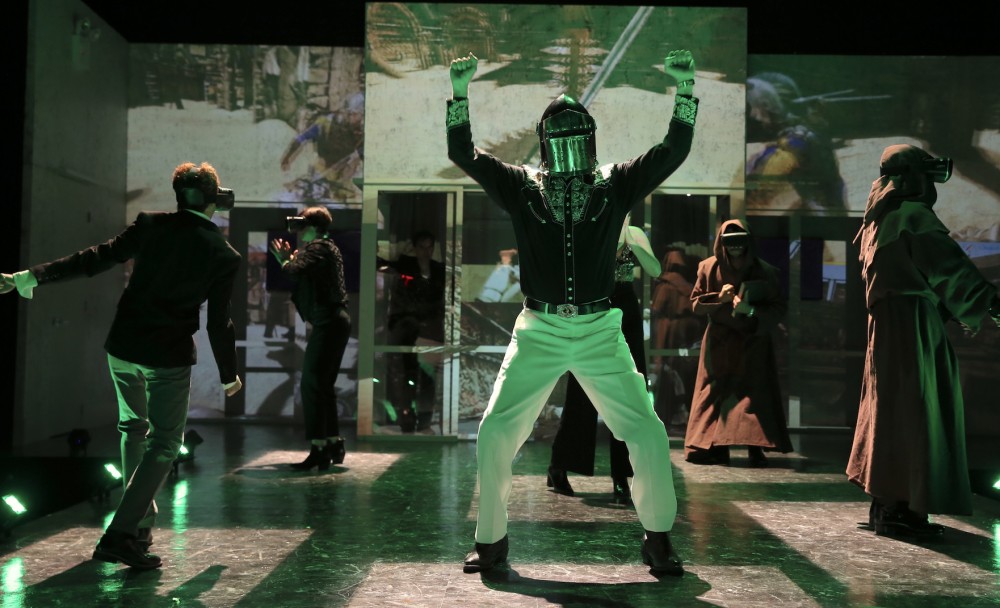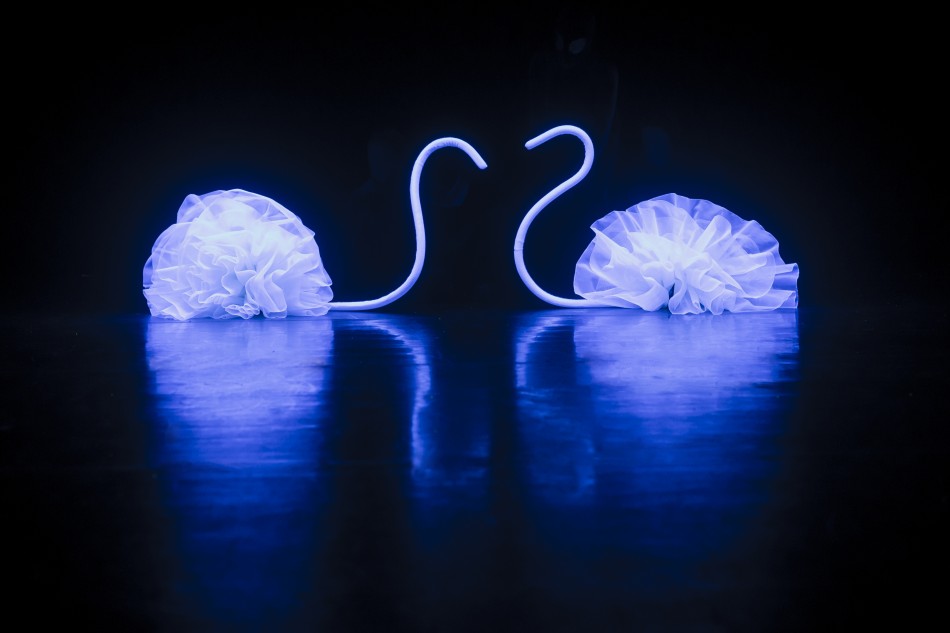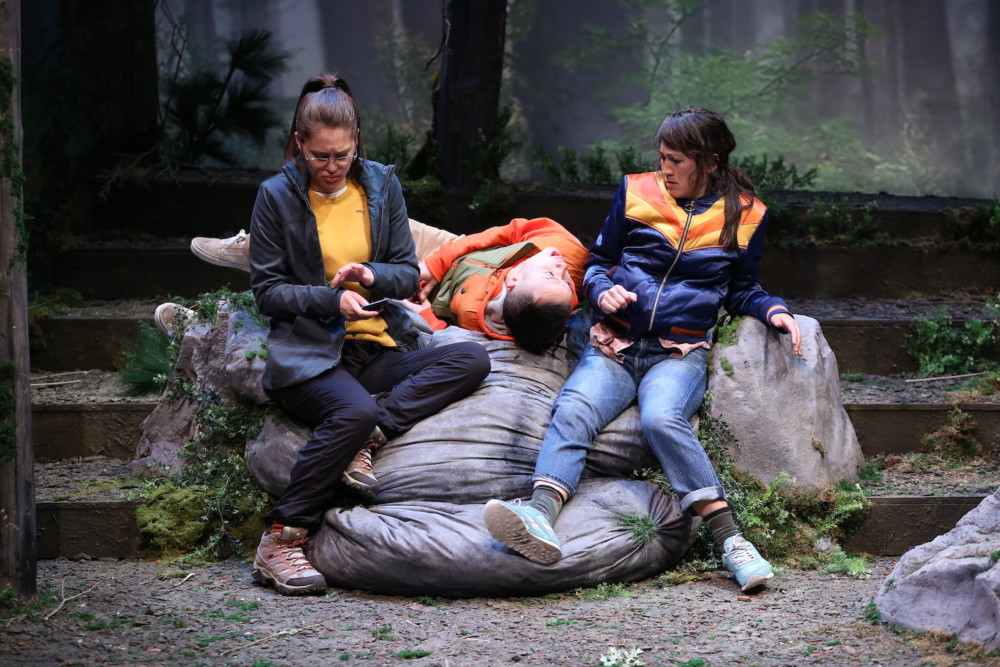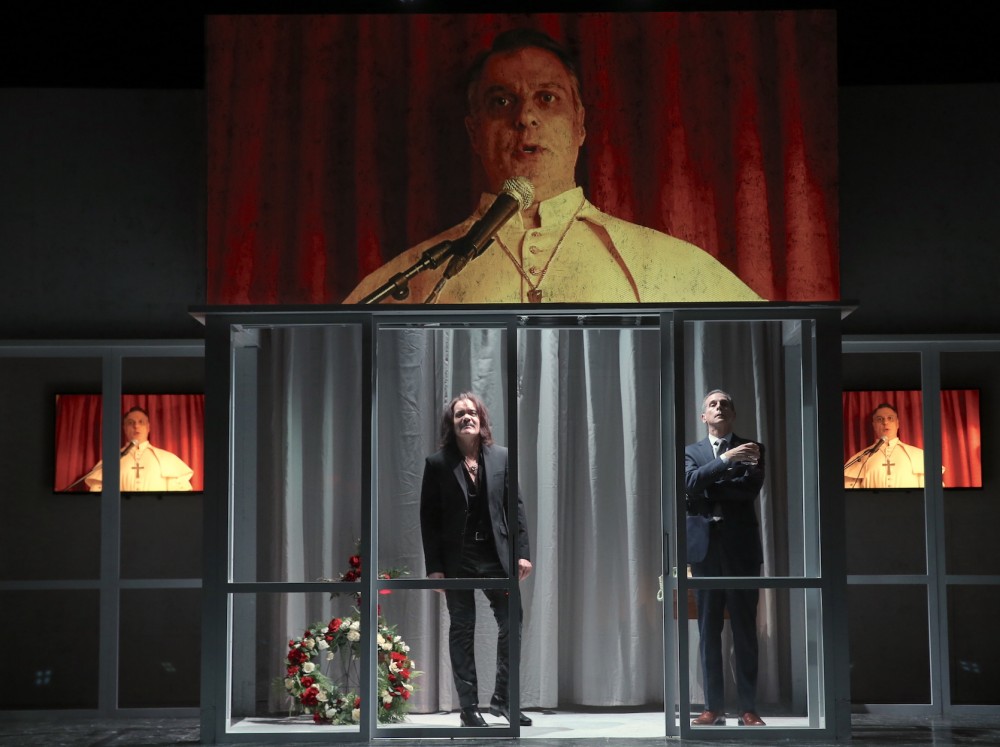
Top: Robert Cuccioli. Below: Derek Smith, T. Ryder Smith
By Samuel L. Leiter
Off-Broadway’s Red Bull Theater (Jesse Berger, artistic director) loves to take risks by staging infrequently seen, even obscure classics (okay, their upcoming Macbeth doesn’t fit that description). Their unconventional productions, highlighting relationships to contemporary concerns, sometimes click, sometimes don’t. With John Webster’s 1612 tragedy, The White Devil, which doesn’t, Red Bull adds to its growing list of Jacobean revivals (including Webster’s The Duchess of Malfi in 2010). However, Webster’s title makes us remember that the road to hell is often paved with good intentions.
The White Devil, which—even heavily cut—runs two hours and 20 minutes, and feels it, is a convoluted tale of corruption, betrayal, adultery, marital discord, misogyny, religious hypocrisy, murder, disguise, and the power politics of “great men.” It’s set in Rome and Padua among a cohort of panders, priests, poisoners, spies, sycophants, courtiers, and cuckolds. A true 1586 event, in which a married Italian duke and a courtier’s wife plotted to kill their respective spouses, inspired it.
A crude summary might note that Duke Brachiano’s (Daniel Oreskes) faithful wife is Isabella (Jenny Bacon), his gorgeous mistress is Vittoria Corombona (Lisa Birnbaum), and her asinine husband is Camillo (Derek Smith). Assisting in the murders of Isabella and Camillo is Vittoria’s favor-seeking, Machiavellian brother, Flaminio (Tommy Schrider). Vittoria is arrested, and, in the best scene, shows her mettle when tried by the soon-to-be appointed pope, Monticelso (Robert Cuccioli), who banishes her to a home for penitent whores. After she flees, she and Brachiano are excommunicated.
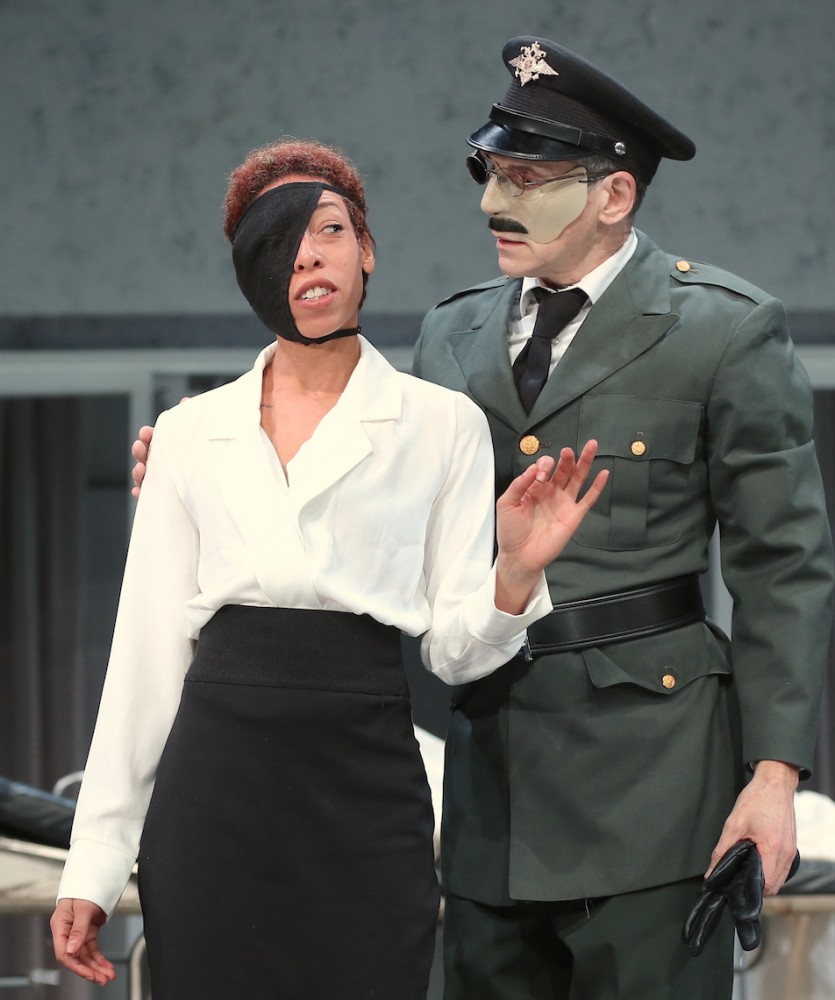

Cherie Corinne Rice, Daniel Oreskes
Although the script presents Vittoria as being as lascivious as Brachiano, director Louise Proske gilds the lily by having her winking and gesturing to Flaminio to indicate she’s playing a role as part of a scam designed to gull her lover, as if she needed yet another sin on her pretty head.
Meanwhile, Isabella’s brother, Francesco de Medici (T. Ryder Smith), Duke of Florence, and his devotees, the debauched Lodovico (Derek Smith) and Gasparo (Edward O’Blenis), take mortally gruesome vengeance on Brachiano, poisoning his helmet’s mouthpiece and strangling him. Flaminio, Vittoria, and Vittoria’s “Moorish” servant, Zanche (Cherie Corinne Rice), participate in a triple suicide plan that has an unexpected outcome before they meet their cruel fates at the hands of Lodovico and Gasparo. Lodovico is slain and Brachiano’s young son, Giovanni (Rice), takes over his father’s dukedom.
The White Devil; or the Tragedy of Paolo Giordano Ursini, Duke of Brachiano, With the Life and Death of Vittoria Coronbona, the famous Venetian Curtizan, to give its full title, has had multiple British stagings but only a few in New York. The first was in 1947 at the Equity Library Theatre; the second in 1955 for only one night by the Phoenix Theatre in a “sweater-girl,” gangland-style production, which the same director, Jack Landau, used for a 1965 revival at the old Circle in the Square, with Frank Langella winning an Obie as Flaminio; and a fourth in 2001, at BAM, by Australia’s Sydney Theater Company in what the New York Times called “classic though not period-accurate glamour”; it was advertised as “‘Reservoir Dogs’ Meets ‘The Godfather.’”
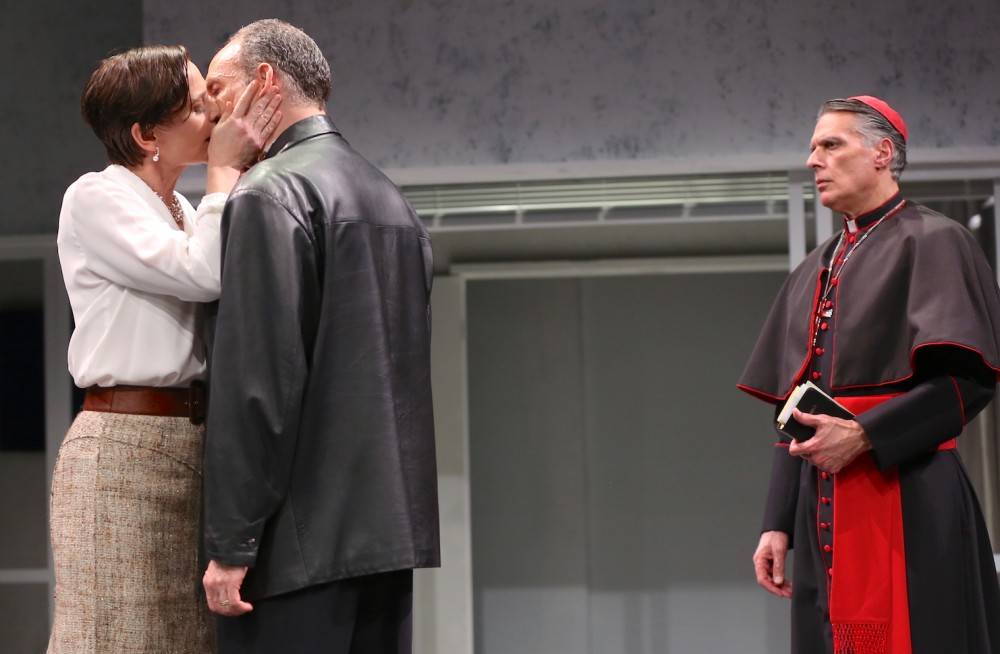

Lisa Birnbaum, Daniel Oreskes, and Robert Cuccioli,
Proske has gone the modern route (with clothes by Beth Goldenberg), distributed 20 roles among 11 actors, and provided a panoply of the kind of clichéd gimmicks often used to yank Shakespeare and his contemporaries into the present: video projections, helmeted cops in SWAT uniforms, pistols and Uzis, cross-gender casting, knives instead of swords (despite the retention of that word), bodyguards in suits and sunglasses, and so on.
The technically proficient video sequences are flashy but most make little sense. Those showing the murders of Isabella (she kisses a poisoned picture) and Camillo—supposedly conjured by a magician for Brachiano’s viewing—are little more than carefully edited movie clips. And Camillo’s murder comes not by a fall from a vaulting-horse, as in Webster (and a program note), but by having a weighted barbell pressed against his neck, requiring some dialogue snipping to justify it.
Most of the conventional ingredients of Jacobean blood tragedy play their part. Aside from one or two honest characters, like Isabella or Vittoria’s mother, Cornelia (Socorro Santiago), evil schemes and deeds follow one another from many malefactors. So many, in fact, it becomes impossible to say not only who the central character is but to whom the title points.
Designer Kate Noll has, for the first time in my long experience of visiting the Lucille Lortel Theatre, changed its configuration to allow for a deep thrust stage surrounded by seating on three sides. Upstage is a modernistic white wall and glassed-in area, but, regardless of Jiyoun Chang’s many lighting cues, barely any attempt is made to differentiate one locale from another in the episodic play.
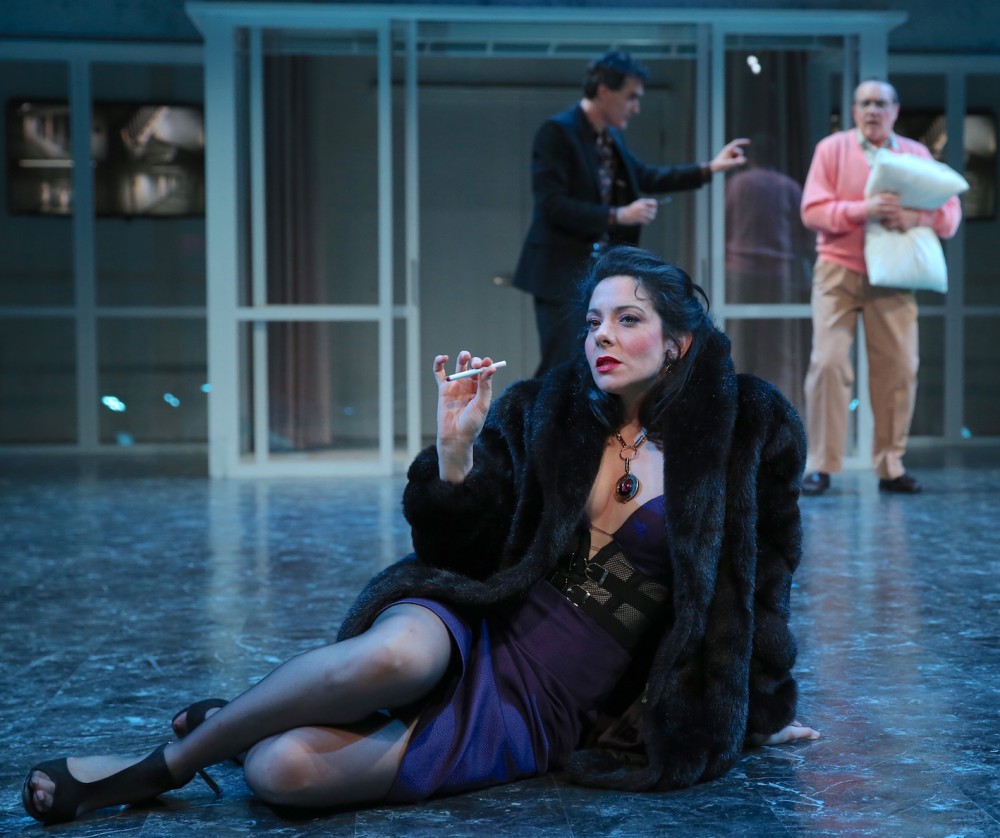

Lisa Birnbaum with Tommy Schrider and Derek Smith
Webster’s metaphoric language has many gems but can be as difficult to follow as the play’s multiple threads, described by its Australian director in 2001 as “a latticework of intertwining stories that collide.” Thematically pertinent as the play may be, the audience is mainly concerned with figuring out what’s what and who’s who (everyone seems to be someone’s brother, made more confusing by casting African-American actor Amara James Aja as the brother and son of, respectively, a white man and woman).
The biggest devil plaguing this production is the clash between its high-flown rhetorical style and overblown acting with its modern-dress approach. If the intent is to underline the play’s relevance by giving it a nowadays appearance, the acting needs to be more straightforwardly realistic. I’ll resist mentioning the worst offenders but I could count the number of believable moments on one hand.
Ultimately, everything turns into melodramatic caricature. When the body count and other fustian pile up during a chaotic conclusion bordering on silliness (wait for the electric drills), The White Devil becomes more laughable Jacobean travesty than laudable Jacobean tragedy. And that’s no bull, red or otherwise.
The White Devil. Through April 14 at the Lucille Lortel Theatre (121 Christopher Street, between Hudson and Bleecker Streets). Two hours 30 minutes with one intermission. www.redbulltheater.com
Photos: Carol Rosegg


